Overview
This article underscores the critical importance of asking the right questions during interviews, a strategy that significantly enhances the hiring process by thoroughly assessing candidates’ qualifications, personality, and cultural fit. Effective questioning not only fosters greater candidate engagement and transparency but also culminates in improved hiring outcomes. Statistics reveal that self-awareness, emotional intelligence, and alignment with company values are paramount in recruitment success.
In the competitive landscape of the financial sector, organizations face unique recruitment challenges. It is essential to recognize how labor laws impact hiring practices and to navigate these complexities with confidence. Personalized recruitment services tailored specifically to the financial industry can yield substantial benefits, ensuring that the right talent is matched with the right roles.
Consider the testimonials from satisfied clients who have experienced transformative results through our tailored approach. Their success stories reinforce the conviction that strategic questioning and an understanding of industry nuances lead to superior hiring decisions.
As you reflect on your hiring strategies, ask yourself: Are you leveraging the power of effective questioning to enhance your recruitment outcomes? We invite you to reach out for a consultation, where our expertise can guide you in refining your hiring practices for optimal success.
Key Highlights:
- Effective interview questions assess not only qualifications but also personality, work ethic, and cultural fit.
- 40% of interviewers believe a candidate’s confidence influences hiring outcomes significantly.
- 50% of job seekers feel stressed due to lack of transparency regarding pay and scheduling, indicating a need for open communication.
- Candidates who research the company and understand its mission are more likely to align with its culture.
- 80% of job seekers have declined offers due to negative interview experiences, highlighting the need for a positive atmosphere.
- Self-awareness is critical; only 10-15% of individuals accurately perceive their self-awareness, making colleague feedback essential.
- Inquiries about conflict resolution reveal candidates’ emotional intelligence and ability to foster a positive work environment.
- 76% of employees value long-term career growth, which influences their commitment to the organization.
- Promoting open dialogue during interviews enhances candidate engagement and allows for better assessment of motivations and fit.
Introduction
In the competitive landscape of talent acquisition, the significance of effective interview questions cannot be overlooked. These questions serve as a vital tool for employers, not only to assess candidates’ qualifications but also to uncover their personality traits, work ethic, and cultural fit within the organization.
As companies navigate the complexities of hiring in 2025, understanding how to craft questions that delve into candidates’ motivations and experiences becomes paramount. With a staggering 40% of interviewers recognizing the impact of a candidate’s confidence on hiring decisions, the power of well-structured inquiries is more crucial than ever.
This article explores the art of formulating impactful interview questions, offering insights into best practices and strategies that can lead to more informed hiring decisions and ultimately, a thriving workforce.
The Significance of Effective Interview Questions
In the recruitment process, asking the right question during interviews is crucial for effective evaluation. It serves not only to assess an applicant’s qualifications but also to uncover their personality, work ethic, and cultural fit within the organization. By strategically crafting impactful questions, employers can delve into applicants’ deeper motivations and identify potential red flags. This ultimately leads to more informed recruitment decisions. This approach is particularly relevant in 2025, where 40% of interviewers acknowledge that a candidate’s overall confidence significantly influences hiring outcomes. Well-structured questions can uncover this essential trait.
The significance of effective questioning techniques is underscored by the fact that 50% of job seekers report feeling stressed due to a lack of transparency regarding pay and scheduling changes. This highlights the necessity for employers to promote open communication during discussions, which can be achieved through well-structured questions that encourage dialogue. Amanda, a dedicated recruiter at Boutique Recruiting, exemplifies this approach by fostering strong connections with applicants, ensuring they feel calm and understood throughout the selection process.
Practical examples demonstrate how effective inquiries enhance applicant evaluation. For instance, Boutique Recruiting’s meticulous approach to understanding company culture and specific job requirements enables them to deliver candidates who not only meet technical qualifications but also align with the organizational environment. This focus on personalized service has led to successful placements in technical and HR roles, reinforcing the firm’s reputation as a trusted recruiting partner.
As Thalia Barrera states, “Succeed in your upcoming meeting with this list of data warehouse questions curated by a data engineer!” This emphasizes the importance of customized inquiries in the assessment phase.
Moreover, best practices for conducting discussions, especially in a virtual setting, include:
- Ensuring a reliable internet connection
- Testing audio and visual setups
- Providing clear instructions to candidates
These elements contribute to a smoother selection process, allowing employers to focus on the quality of their questions and the insights they yield.
In summary, the significance of asking the right question during interviews cannot be overstated. The best question to ask is an essential tool for improving selection decisions, enhancing recruitment success, and ultimately building a workforce that thrives within the company culture. By embracing transparency and authenticity, as Amanda does in her role, employers can attract top talent and navigate the competitive workforce landscape more effectively.
Candidates should be forthcoming about their workstyle preferences, salary expectations, and any unique personal circumstances. This level of transparency builds trust and enables hiring managers to assess suitability for the role.
What Attracted You to This Position?
Inquiring about what attracted applicants to the position serves as a vital tool for evaluating their enthusiasm and commitment. Candidates who have taken the initiative to research the company and grasp its mission are often more likely to align with the organizational culture and values. The best question to ask when interviewing someone is one that not only assesses their interest but also motivates individuals to share their career aspirations, potentially uncovering synergies with the company’s objectives.
Comprehending applicant motivation is crucial, as it directly influences their engagement and performance. Research indicates that individuals who feel a strong connection to a company’s mission are more likely to exhibit higher levels of commitment and satisfaction in their roles. This commitment can be further evaluated through focused inquiry questions that explore their values and how they resonate with the company’s goals.
Furthermore, statistics emphasize the importance of applicant enthusiasm in the recruitment procedure. For instance, 80% of job seekers report that they have declined job offers due to negative interview experiences, underscoring the need for a positive and engaging interview atmosphere. This is where Boutique Recruiting shines, as demonstrated by testimonials from applicants who have commended the personalized assistance and smooth communication they experienced throughout the recruitment process.
Candidates like Magaly B. noted, “I could call her anytime with questions and best of all, I got the job!” and Doug B. remarked on the excellent communication and professionalism of the recruiters at Boutique Recruiting, which made a significant difference in their experiences, ultimately leading to successful job placements.
Additionally, hiring managers acknowledge the impact of applicant follow-up, with 80% stating that receiving a thank-you note influences their decision-making, and 22% indicating it has a significant effect. Prompt communication is crucial in sustaining a positive interview experience, a principle that Boutique Recruiting embodies through its commitment to participant engagement.
In the current war for talent, nurturing applicant enthusiasm is more important than ever. Case studies demonstrate the advantages of improving the applicant experience after the offer through pre-boarding activities—such as personalized calls from managers—which can significantly boost new employees’ likelihood to refer others by 137%, thereby enhancing the overall perception of the company. Engaging applicants during the period between offer acceptance and start date not only builds loyalty but also reinforces their commitment to the organization, as highlighted in the case study titled “Enhancing Applicant Experience Post-Offer.”
Ultimately, by prioritizing applicant enthusiasm and understanding their motivations, employers can determine the best question to ask when interviewing someone, leading to more informed hiring decisions that result in better alignment between applicants and the company, thereby improving retention and performance. Boutique Recruiting’s method for tailored recruitment and effortless interview experiences exemplifies how organizations can attract and retain top talent in today’s competitive environment, effectively addressing potential concerns during the interview to ensure a smooth and positive experience for all applicants.
How Do You Approach Decision-Making?
Exploring an individual’s decision-making approach provides invaluable insights into their analytical skills and their capacity to evaluate options effectively. Candidates who articulate their thoughts clearly and present concrete examples of past decisions not only demonstrate their ability to manage responsibilities but also emphasize their adaptability in a rapidly changing work environment. Research indicates that recruiting based on abilities is five times more predictive of job performance than relying solely on educational history, underscoring the necessity of evaluating analytical skills during the assessment process.
To effectively gauge an applicant’s decision-making skills, the most insightful question to pose during an interview is one that uncovers their thought processes. For example, asking about a challenging decision they faced and the steps they undertook to reach their conclusion not only assesses their analytical capabilities but also sheds light on their problem-solving skills.
A case study examining the impact of job description tone reveals that 75% of applicants respond favorably to job descriptions that utilize straightforward language. This finding highlights the essential nature of clarity in communication, not only in job postings but also in discussions. Candidates who feel comfortable and understood are more likely to articulate their decision-making strategies candidly.
This aligns with the statistic that nearly 50% of job seekers discover opportunities through word of mouth, illustrating the importance of a positive applicant experience in attracting top talent.
Moreover, statistics show that 60% of individuals consider a company’s application process to be a deal breaker. A cumbersome application procedure can deter applicants, potentially preventing them from showcasing their analytical abilities during evaluations. Therefore, creating a welcoming discussion environment can encourage individuals to express their analytical methods more openly.
As competition for talent intensifies, it is imperative for Boutique Recruiting to ensure that managers navigate the selection phase smoothly, as top candidates evaluate your organization just as you evaluate them.
Ultimately, comprehending how applicants make decisions can assist in identifying the most effective questions to ask during interviews, allowing for a thorough assessment of their overall abilities and compatibility within your organization. By prioritizing analytical capabilities in your recruitment strategy and fostering an environment of transparency and authenticity—where individuals are encouraged to share their workstyle preferences and motivations—you can enhance your team’s effectiveness and adaptability in today’s competitive landscape. As noted by SHRM, nearly 44% of remote employees experience feelings of isolation or disconnection, emphasizing the critical need for effective communication and connection throughout the interview process.
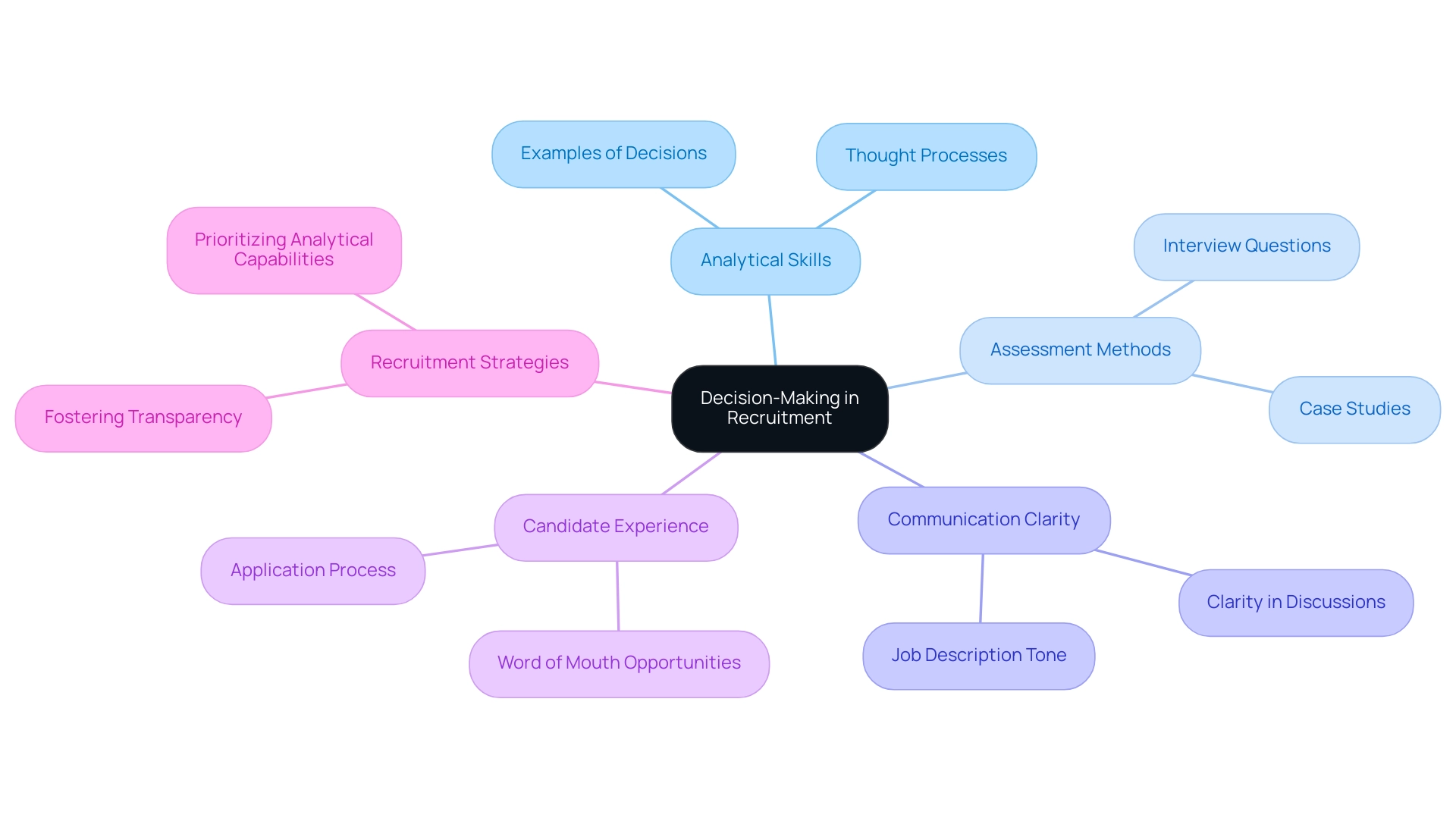
Describe Your Role in Team Projects
Incorporating questions about individuals’ roles in team projects is crucial for evaluating their collaboration and communication skills. Candidates who can clearly articulate their contributions and the outcomes of team efforts not only showcase their ability to work effectively with others but also highlight their understanding of teamwork dynamics. This is particularly vital in environments where collaboration is essential for achieving shared goals.
As Libby Marks states, ‘Healthy teams communicate effectively, trust and challenge one another, and achieve shared goals together.’
Statistics reveal that collaborative teams are 33% more likely to complete projects on time, underscoring the importance of teamwork in hiring decisions. By evaluating how applicants have navigated team dynamics, employers can gain insights into their potential fit within the organization. For instance, empowering employees to make delegated decisions has been shown to increase the likelihood of success by 3.9 times, further emphasizing the need for strong collaboration skills.
To effectively evaluate these skills during interviews, the best question to ask is to have candidates discuss specific examples of their teamwork experiences. This method not only assesses their communication skills but also offers insight into their problem-solving and decision-making strategies in a team environment. Tools like ProofHub are acknowledged for tackling collaboration challenges and improving team interaction and performance, which can be advantageous in assessing individuals’ teamwork abilities.
Case studies, such as the implementation of Sight—a digital collaboration tool—illustrate how enhancing workplace communication can lead to improved productivity and reduced turnover. Zight’s features, including screen recording and advanced analytics, have proven effective in addressing modern workplace challenges, reinforcing the value of strong collaboration skills.
Ultimately, prioritizing teamwork and communication skills in evaluations can lead to more cohesive teams and successful project outcomes, making it a critical focus in the hiring process.
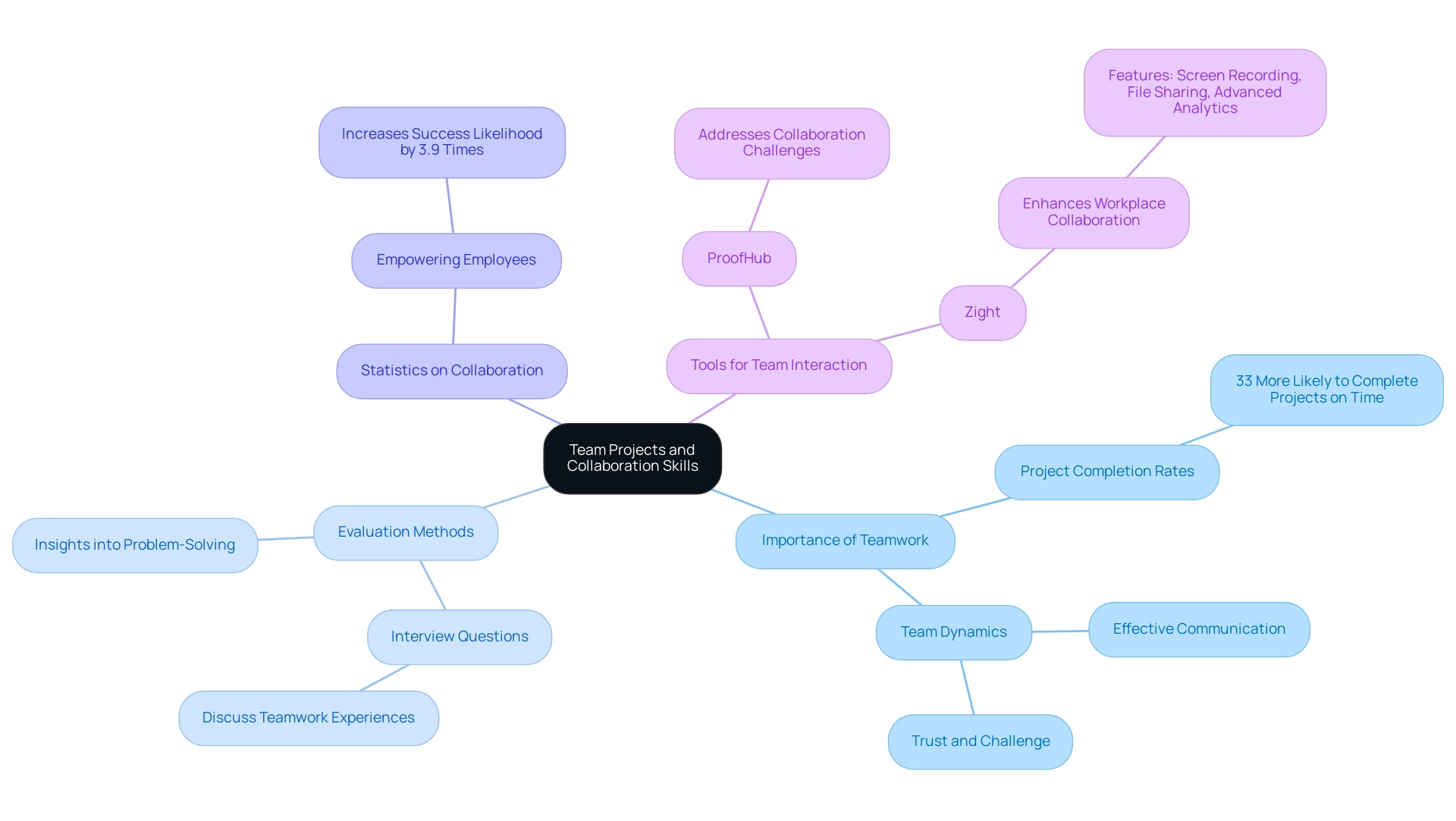
How Would Your Colleagues Describe You?
When individuals contemplate how their colleagues would characterize them, it unveils valuable insights into their self-awareness and the impact they have on their work environment. This inquiry can illuminate essential traits such as teamwork, leadership, and communication skills, making it the most effective question to pose during interviews aimed at fostering a collaborative atmosphere. Candidates who can articulate specific examples of feedback from colleagues not only showcase their interpersonal skills but also demonstrate a profound understanding of their role within a team.
Statistics reveal a striking discrepancy: while 95 percent of individuals believe they possess self-awareness, only 10-15 percent actually do. This gap underscores the significance of evaluating individuals through the lens of colleague feedback, serving as a more objective measure of their self-perception and effectiveness in a team setting.
Moreover, case studies illustrate that self-awareness can yield both positive and negative implications in leadership roles. For instance, self-aware leaders often excel in recognizing their strengths and weaknesses; however, excessive introspection can lead to challenges such as decision paralysis and micromanagement. This scenario highlights the necessity for applicants to balance self-awareness with actionable insights, ensuring they can contribute positively to team dynamics without falling prey to overanalysis.
Incorporating feedback from colleagues during the assessment stage not only enriches the evaluation of individuals but also emphasizes the critical question to ask when interviewing someone. This reflects the growing acknowledgment of its importance in hiring decisions. Real-world examples demonstrate that the best question to ask during interviews is how candidates have received positive endorsements from peers, as individuals with such feedback tend to be more successful in collaborative roles, reinforcing that colleague feedback is a vital component of effective evaluation. In today’s competitive talent acquisition landscape, applicants are not merely assessing their fit for the role; they are also determining the best question to ask when interviewing someone to evaluate the company and its culture during the interview process.
Boutique Recruiting, celebrated for its remarkable history of success and status as a reliable recruiting associate, underscores the importance of self-awareness and colleague feedback in its selection practices. The firm’s expertise in sourcing high-quality talent across diverse industries—including roles such as Chief of Staff, Engineer, and HR Director—showcases its commitment to personalized recruitment solutions. As Eric Eddy from CPA Resources Global Professionals noted, Boutique Recruiting’s capacity to provide top-notch talent swiftly and efficiently is a testament to their effective evaluation methods.
Additionally, the upcoming Leadership Lunch and Learn session on ‘Conflict Resolution’ highlights the relevance of these discussions in today’s hiring landscape, further underscoring the importance of understanding applicant dynamics through colleague insights.
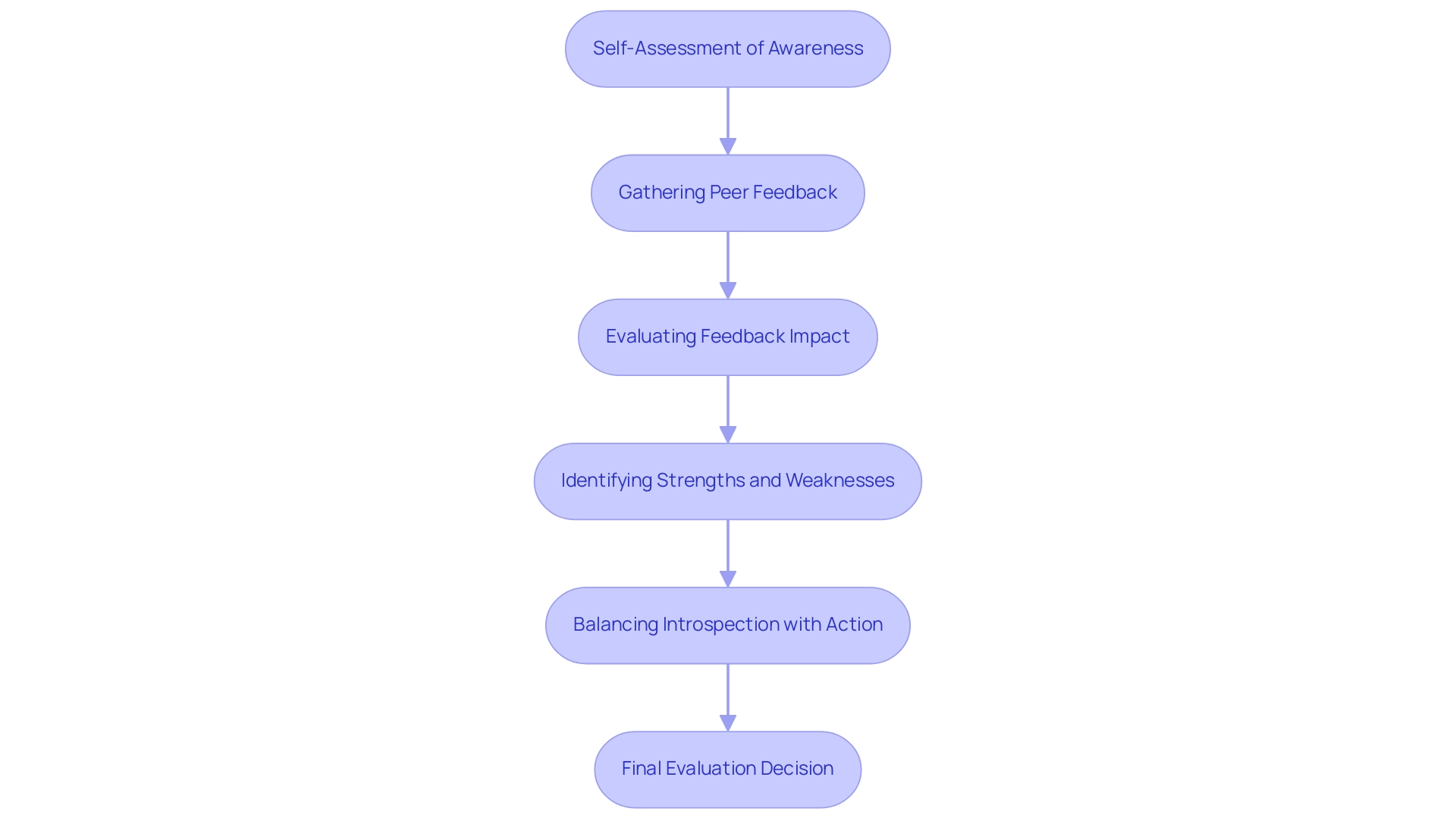
What Accomplishment Are You Most Proud Of?
Inquiring about applicants’ proudest accomplishments serves as a powerful tool for showcasing their skills and contributions, particularly in niche positions that Boutique Recruiting specializes in, such as General Counsel, CFO, or Chief Technology Officer. This question not only brings their achievements to the forefront but also uncovers what they truly value in their professional lives. Candidates who express pride in their accomplishments tend to demonstrate a strong commitment to their work, which can translate into exceptional performance in future roles.
Research indicates that pride in one’s achievements is closely linked to job performance, with individuals who articulate their successes often exhibiting higher levels of engagement and productivity.
Moreover, understanding how individuals evaluate their own accomplishments can provide valuable insights into their character and work ethic. For instance, a study analyzing over 370,000 applicant experience surveys revealed that feedback quality significantly impacts applicants’ Net Promoter Score (NPS), particularly among those who were not chosen. This underscores the importance of not only recognizing achievements but also providing constructive feedback during the hiring process.
As noted in the case study titled ‘Drivers of Candidate Net Promoter Score (NPS),’ the quality of feedback and company policies on diversity, equity, and inclusion are significant factors influencing applicant experience.
To effectively evaluate an individual’s pride in their accomplishments, the best question to ask when interviewing someone is to inquire about specific instances where they excelled. This approach not only highlights their skills but also fosters a deeper conversation about their motivations and values, which is crucial for high-demand roles in finance and technology. For instance, requesting individuals to explain a challenging project they successfully completed can uncover their problem-solving abilities and resilience.
Ultimately, prioritizing achievements in evaluations is crucial for identifying individuals who will thrive within the organization. Candidates who take pride in their work are more likely to remain engaged and committed, contributing to higher employee retention rates. As Niels Rozemeijer stated, “65% of happy candidates are likely to do business with you again,” reinforcing the idea that positive candidate experiences lead to better engagement.
By concentrating on these elements during interviews, managers can improve their selection methods and attract top talent that aligns with the company’s objectives and culture. Additionally, adhering to fair selection practices, such as the four-fifths rule, ensures that the hiring process is equitable and inclusive, further strengthening the organization’s reputation in the competitive job market. Boutique Recruiting’s custom search services are designed to meet the unique needs of clients in the legal, finance, and technology sectors, ensuring a tailored approach to recruitment that aligns with the specific requirements of each position.
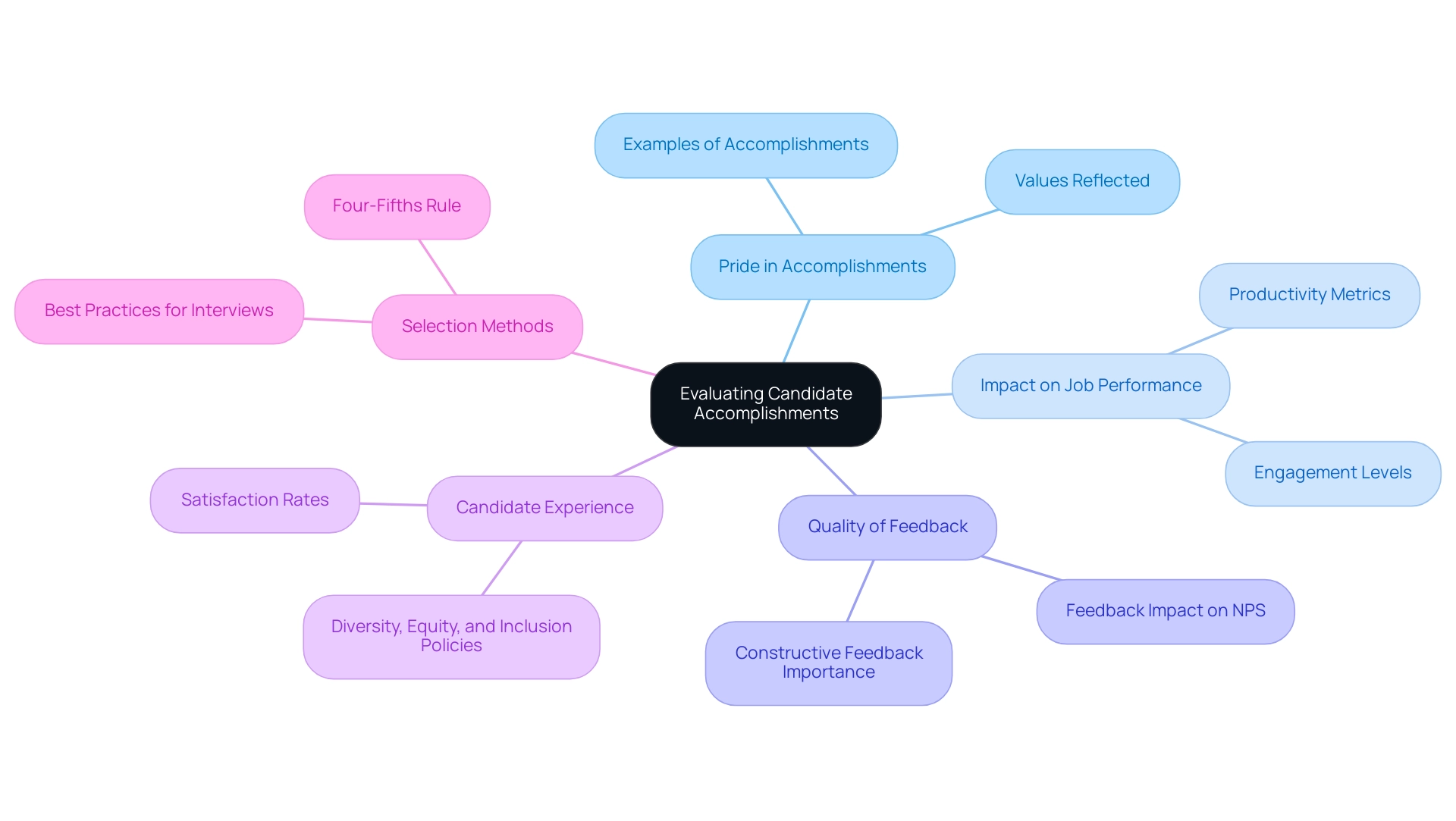
How Do You Define a Good Work Culture?
Exploring an applicant’s definition of a good work culture is essential for uncovering their core values and expectations. Candidates who emphasize collaboration, respect, and opportunities for growth are often best suited for environments that nurture these attributes. This inquiry not only reveals the individual’s personal values but also serves as a critical gauge for cultural alignment with the organization.
The importance of cultural fit cannot be overstated; research indicates that employees who resonate with their company’s mission and values are 67% more engaged in their roles. Additionally, more than half (58%) of employees would accept a position with a competitor if the new organization offered a better culture, underscoring the critical importance of cultural alignment in recruitment choices. This heightened engagement translates into improved job satisfaction and retention rates, ultimately benefiting the organization as a whole.
Moreover, companies with strong employer brands experience an 11.6% increase in shareholder returns and a 50% reduction in cost-per-hire, highlighting the financial advantages of prioritizing cultural alignment in hiring decisions.
Real-world examples illustrate how aligning applicant values with company culture can lead to successful placements. For instance, Amanda, a dedicated recruiter at Boutique Recruiting, exemplifies the firm’s commitment to personalized service and relationship building. By meticulously understanding both company culture and specific job requirements, Amanda and her team perform custom searches tailored to the unique needs of each organization.
This ensures they successfully deliver individuals who not only meet technical qualifications but also integrate seamlessly into the organizational environment. This approach reinforces Boutique Recruiting’s reputation as a trusted recruiting partner, as evidenced by numerous 5-star reviews highlighting their exceptional talent acquisition and personalized service. Furthermore, the best question to ask when interviewing someone about work culture allows employers to define what constitutes a positive work environment for their organization. This approach not only assists in applicant evaluation but also promotes a deeper understanding of how potential hires perceive and value workplace dynamics.
Ultimately, aligning applicant values with the company’s culture is a strategic move that enhances employee satisfaction and drives long-term success.
How Do You Handle Conflict in the Workplace?
Inquiring about how applicants handle conflict during interviews reveals crucial insights into their emotional intelligence and interpersonal skills. Candidates who can articulate their conflict resolution strategies not only demonstrate their ability to navigate challenging situations but also underscore their potential to cultivate a positive work environment. This line of questioning is particularly relevant in team-oriented roles, where collaboration is essential for achieving organizational objectives.
Research indicates that empowering employees to resolve conflicts is a strategic investment for managers, leading to improved productivity and morale. Notably, 33% of employees have reported that conflicts can result in enhanced working relationships, highlighting the significance of effective conflict management. As Booij L H. noted, “Conflicts in the operating theatre…” which emphasizes the necessity of addressing conflicts constructively.
Furthermore, the importance of emotional intelligence in recruitment cannot be overstated. Candidates with high emotional intelligence are better equipped to manage workplace dynamics, as they can empathize with colleagues and adeptly navigate interpersonal challenges. This skill set is vital in mitigating conflicts and fostering a collaborative atmosphere.
The financial ramifications of poor conflict management are considerable, with disengaged managers costing the U.S. between $77 billion and $96 billion annually, underscoring the importance of investing in conflict resolution skills.
Case studies, such as the CIPD research on leadership training, illustrate that managers equipped with conflict resolution skills can significantly enhance team relationships. The research found that training markedly improves managers’ ability to assist teams in building healthy relationships; however, without adequate training, the effectiveness of these managers wanes, reinforcing the necessity for organizations to invest in leadership development.
When evaluating applicants, the most effective question to pose during interviews targets their conflict resolution skills. For example, ask about a specific conflict they encountered in a previous role and how they approached it. This not only sheds light on their problem-solving abilities but also reflects their capacity to positively contribute to team dynamics.
By prioritizing emotional intelligence and conflict resolution skills in your hiring process, you can select individuals who will thrive in collaborative environments and propel your organization’s success.
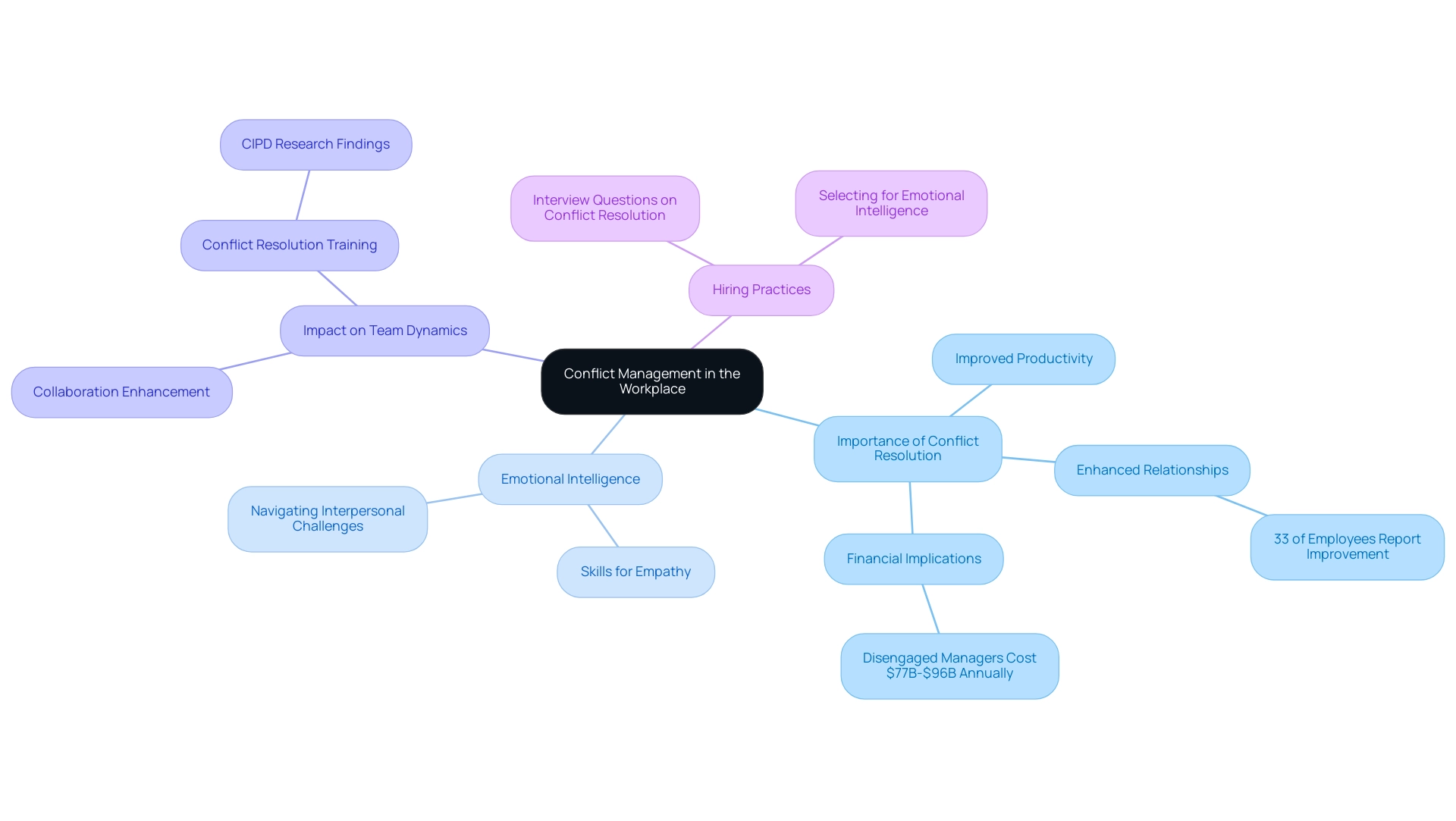
Where Do You See Yourself in Five Years?
Exploring an applicant’s five-year vision is crucial for evaluating their ambition and long-term goals. Candidates who articulate a clear vision for their future are often more inclined to pursue growth opportunities within the organization. This alignment not only fosters increased job satisfaction but also enhances retention rates, creating a win-win scenario for both the applicant and the employer.
Statistics reveal that 76% of employees consider long-term career growth a vital factor when evaluating job offers, which directly influences their commitment to their roles. Furthermore, organizations that prioritize positive applicant experiences are twice as likely to see improvements in their Net Promoter Score (NPS), indicating that a focus on long-term goals can significantly impact overall satisfaction and loyalty.
Real-world examples illustrate how career aspirations influence hiring decisions. For instance, companies that evaluate applicants’ long-term goals during interviews often find that those who envision a future with the organization are more engaged and productive. This approach not only aids in identifying the right fit but also contributes to building a diverse and high-performing team, as diverse teams are known to make better decisions 87% of the time.
To effectively assess ambitions, interviewers can use the best question to ask when interviewing someone regarding the individual’s five-year vision. Expert opinions suggest that the best question to ask when interviewing someone can reveal valuable insights into an applicant’s motivation and alignment with the company’s long-term objectives. Shelby Palmeri Farris notes that 47% of job seekers feel AI chatbots make recruitment feel impersonal, highlighting the importance of a personalized approach in contrast to automated methods.
By prioritizing these discussions, employers can enhance their hiring processes and cultivate a workforce that is not only skilled but also deeply invested in the organization’s success. At Boutique Recruiting, Amanda exemplifies this meticulous approach to understanding company culture and specific job requirements. Her commitment to personalized applicant care ensures that she builds strong relationships with individuals, making them feel calm, understood, and confident before interviews. Amanda’s effectiveness is demonstrated in the numerous 5-star reviews from clients who praise her ability to deliver quality applicants swiftly and effectively.
By concentrating on long-term objectives and nurturing positive applicant experiences, Boutique Recruiting not only attracts top talent but also contributes to their long-term success within the organization. In today’s competitive talent landscape, this personalized recruitment strategy is essential for standing out and securing the best individuals.
What Questions Do You Have for Us?
Motivating applicants to inquire not only allows them to express their curiosity about the position and the organization but also aids them in determining the best questions to ask during interviews. This fosters a vibrant two-way conversation that enhances the discussion experience. Such interactions offer applicants the opportunity to clarify uncertainties, which is essential in a competitive job market where half of employers report losing quality talent due to ineffective assessment processes. By inviting inquiries, employers signal their commitment to transparency and open communication, significantly enhancing the overall applicant experience.
Research indicates that 40% of interviewers believe an interviewee’s confidence plays a pivotal role in hiring decisions. This underscores the importance of soft skills and personality during interviews. When individuals feel engaged and encouraged to participate actively, it not only reflects their genuine interest in the position but also enables employers to gauge their enthusiasm and fit for the company culture. This is particularly crucial for high-demand roles such as CFOs, Financial Managers, and Directors of Finance. The best applicants are not merely seeking any position; they are in pursuit of the right role with the right company.
Moreover, a study on the tone of job descriptions revealed that 75% of individuals respond positively to straightforward and professional language. This finding indicates that the manner in which employers convey information from the outset can significantly impact applicants’ perceptions and their readiness to engage in discussions. By cultivating an environment where inquiries are embraced, employers can establish a more welcoming atmosphere that encourages applicants to voice their opinions and concerns. This ultimately guides them to the best questions to ask during interviews, resulting in a more tailored hiring process.
It is also essential to acknowledge that live technical assessments conducted during evaluations can reduce participant performance by 50%. This statistic emphasizes the necessity for employers to reflect on how their assessment methods may unintentionally obstruct applicant performance and involvement. In a talent war, ensuring that the interview process is seamless and respectful of individuals’ time and skills is crucial for attracting top talent.
Ultimately, understanding the significance of participant engagement cannot be overstated. By promoting open dialogue, employers can identify the best questions to ask during interviews, allowing them to better assess candidates’ motivations and suitability for the role, including their workstyle preferences and salary expectations. This leads to more informed hiring decisions and a stronger alignment between individuals and organizational values. As Eric Eddy observed, Boutique Recruiting’s capacity to swiftly and effectively provide exceptional professionals highlights the value of nurturing such involvement.
By prioritizing open communication and encouraging candidates to share personal insights and vulnerabilities, employers can enhance their recruitment strategies and improve overall outcomes.
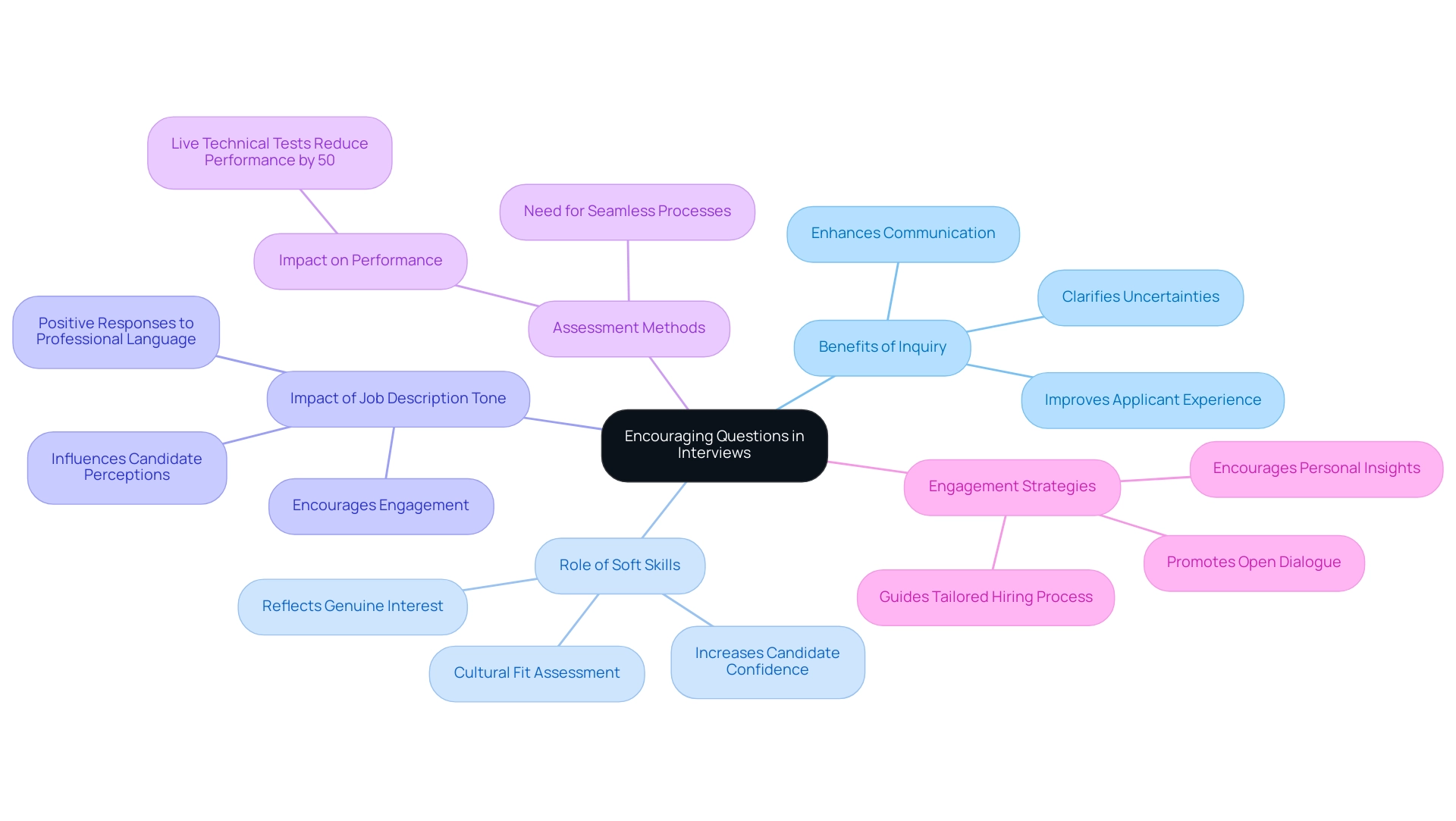
Conclusion
Effective interview questions serve not merely as a tool for evaluating qualifications; they are vital for comprehending candidates’ motivations, work ethics, and cultural fit within an organization. As emphasized throughout this article, strategically crafting these questions can profoundly enhance the hiring process, particularly in the competitive landscape of 2025. By concentrating on elements such as candidate enthusiasm, decision-making approaches, and teamwork dynamics, employers can derive invaluable insights that lead to superior hiring decisions.
Moreover, cultivating a transparent and engaging interview atmosphere is paramount. Candidates who feel at ease and encouraged to ask questions are more inclined to reveal their authentic selves and align their values with the company’s mission. This two-way dialogue not only fosters trust but also enables employers to evaluate candidates’ long-term aspirations and commitment to the organization.
Ultimately, mastering the art of formulating impactful interview questions can revolutionize the hiring process, resulting in a more engaged workforce and reduced turnover rates. Organizations like Boutique Recruiting exemplify how an emphasis on personalized interactions and a deep understanding of candidate dynamics can create a competitive edge in talent acquisition. By prioritizing effective communication and thoughtful evaluation, companies can attract top talent while nurturing a thriving workplace culture that propels long-term success.
Frequently Asked Questions
Why is asking the right questions during interviews important?
Asking the right questions is crucial for evaluating applicants’ qualifications, uncovering their personality, work ethic, and cultural fit, and making informed recruitment decisions.
How does a candidate’s confidence affect hiring outcomes?
In 2025, 40% of interviewers acknowledged that a candidate’s overall confidence significantly influences hiring decisions, highlighting the importance of well-structured questions that can reveal this trait.
What role does transparency play in the recruitment process?
Transparency is essential as 50% of job seekers report feeling stressed due to unclear information about pay and scheduling. Open communication during interviews can be fostered through well-structured questions.
How does Boutique Recruiting exemplify effective questioning techniques?
Boutique Recruiting focuses on understanding company culture and job requirements, allowing them to deliver candidates who align with both technical qualifications and the organizational environment.
What are some best practices for conducting interviews, especially virtually?
Best practices include ensuring a reliable internet connection, testing audio and visual setups, and providing clear instructions to candidates.
What should candidates disclose during the interview process?
Candidates should be open about their workstyle preferences, salary expectations, and any unique personal circumstances to build trust and facilitate better assessment by hiring managers.
How can understanding applicant motivation influence hiring decisions?
Understanding applicant motivation can lead to better alignment between candidates and the company, improving retention and performance, as those connected to the company’s mission are more likely to be engaged.
What impact does applicant enthusiasm have on the recruitment process?
Statistics show that 80% of job seekers have declined offers due to negative interview experiences, emphasizing the need for a positive and engaging atmosphere during interviews.
How does effective communication affect the applicant experience?
Positive communication, such as prompt follow-ups and personalized interactions, enhances the applicant experience, leading to better perceptions of the company and increased likelihood of referrals.
Why is evaluating analytical skills important during interviews?
Evaluating analytical skills is crucial as research indicates that hiring based on abilities is five times more predictive of job performance than relying solely on educational history.
What should interviewers focus on to assess a candidate’s decision-making skills?
Interviewers should ask questions that uncover candidates’ thought processes, such as asking about a challenging decision they faced and the steps taken to reach their conclusion.
How can the application process impact candidate engagement?
A cumbersome application process can deter candidates and prevent them from showcasing their abilities, making it essential to create a welcoming environment that encourages open communication.
